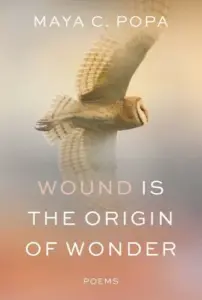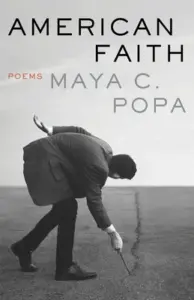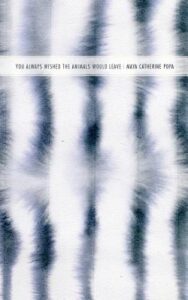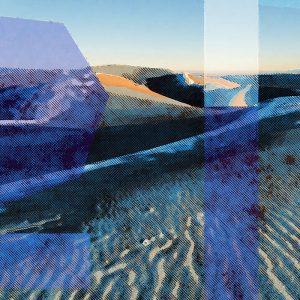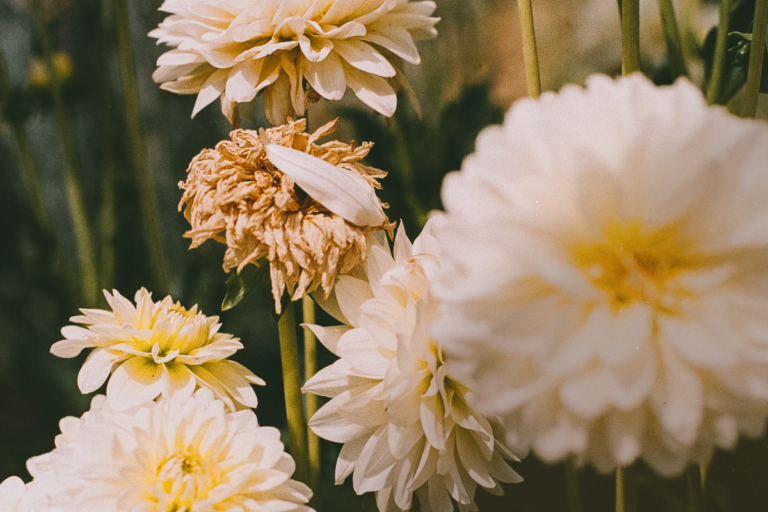Maya C. Popa
They Are Building a Hospital
So much of what was once deemed impossible was found — during Covid — to be possible. Here, a poet watches a tent, a huge temporary hospital, be raised up on the green of Central Park, a place she’d previously walked her dog.
We’re pleased to offer Maya C. Popa’s poem, and invite you to connect with Poetry Unbound throughout this season.
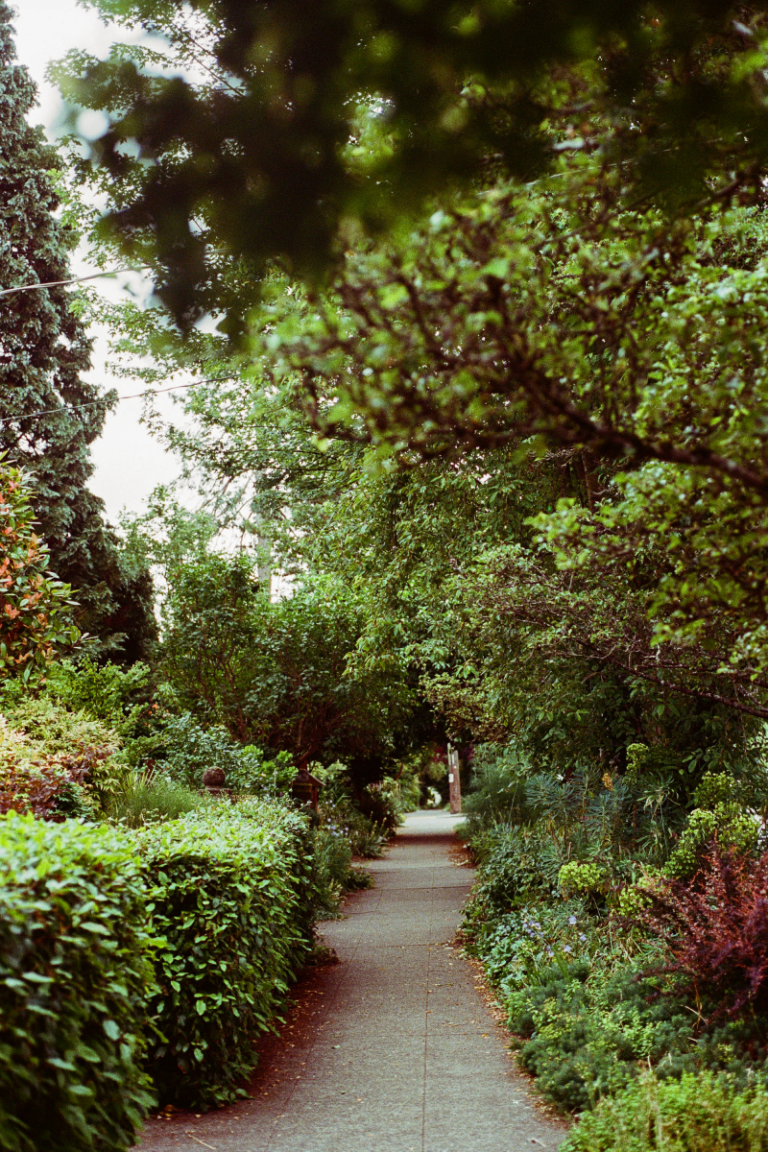
Image by Annisa Hale/ Film processed by Moody's Film Lab, © All Rights Reserved.
Guest
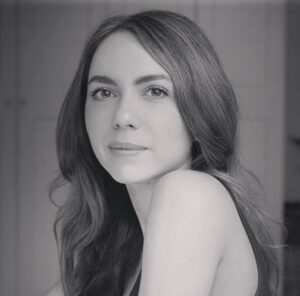
Maya C. Popa is the author of Wound Is the Origin of Wonder (W. W. Norton, 2022) and American Faith (Sarabande, 2019), which was a recipient of the North American Book Prize and a runner-up in the Kathryn A. Morton Prize judged by Ocean Vuong. She is also the author of two chapbooks, both from the Diagram Chapbook series: You Always Wished the Animals Would Leave (New Michigan Press, 2018) and The Bees Have Been Canceled (New Michigan Press, 2017). She is the Poetry Reviews Editor at Publishers Weekly and teaches poetry at New York University. She is Director of Creative Writing at the Nightingale-Bamford school, where she oversees visiting writers, workshops, and readings. She holds degrees from Oxford University, NYU, and Barnard College, and is currently pursuing her PhD on the role of wonder in poetry at Goldsmiths, University of London. Image by Bill Wadman.
Transcript
Transcription by Alletta Cooper
[music: “Praise the Rain” by Gautam Srikishan]
Pádraig Ó Tuama: My name is Pádraig Ó Tuama, and I know when I write poetry, I often want to feel a little bit of perspective from the thing I’m writing about. Maybe a week later, or a month later, or a year, or a decade later. And I have such admiration for poets who can write about change, write about a circumstance right from the middle of it, where there is no sense of: here’s the narrative, here’s where it’s going, here’s where it’s going to land. And they can simply find the artistry to let what is happening in the moment be present. Not by trying to force some unnatural routine or resolution onto it, but also finding a way where the art of the language can hold you together. And maybe where you can recognize yourself in it on a certain level, but also recognize your confusion and change in it.
[music: “Praise the Rain” by Gautam Srikishan]
“They Are Building a Hospital” by Maya C. Popa
“THEY ARE BUILDING A HOSPITAL
“On the field outside my home, a field
hospital, in an actual field, the great American
Oak on one end, the Tupelo on the other.
They have laid white tarp over the boggy grass
and raised a series of insulated tents.
It has blossomed overnight like a dark circus,
machines to dehumidify the air,
cots like dollhouse furniture and intricate
machines to keep alive those whose bodies
are resigned to leaving. An orchestra
of discipline and calculated faith,
of power cords and outlets maneuvered
around trees, of hoping rain holds
and spring reads the room: the human beings
are desperate. They have built a hospital
where, in other days, I walked my dog,
counting no blessing but the one I chased,
who startled strangers on blankets
before stretching on the grass. How happy
I was not knowing how happy, walking
the path along the field’s perimeter,
watching the sky flare its oranges and pinks,
reflect a cool purple off the leaves.
Idling in goodness, letting the mind loose
over the life let it. I thought forever,
did not think, for so much of gladness
was thoughtlessness. Now I mourn
the hours from the safety of my health,
stand a little lost at what proceeds
the mourning. They are building a hospital—
the whir of engines stirs the animals,
a melody, a dirge, the robins sing.”
[music: “Creatures of Myth” by Gautam Srikishan]
So this poem by Maya C. Popa is a Covid poem, and I had wondered how Covid would show up in poetry. And in this one, it’s about contrast, about time before, time after, about how space that had been used for walks and ambling and taking your dog for a walk is now being used as a place of health and building and trying to keep people alive and machines.
For the last few months I’ve been living right by Central Park, and I’ve been walking there multiple times a week. And I regularly think about where this field hospital was as I wander around Central Park, and think that this is a poem that was written during a moment of change.
So the title, “They Are Building a Hospital,” is repeated right at the end of the poem: “They are building a hospital—/ the whir of engines stirs the animals, / a melody, a dirge the robins sing.” And in the middle of the poem, it’s modified slightly. “They have built a hospital / where, in other days, I walked my dog.” I love that dog, by the way. I love the idea of startling “strangers on blankets” before the dog stretches on the grass. And so where there is now a field hospital, made from tarps and tents, it had been a place of such joy, such almost unselfconscious enjoyment. “So much of gladness / was thoughtlessness,” she said. And now she’s looking at what’s there and mourning what’s happened, and also profoundly aware of health. “I mourn / the hours from the safety of my health.” And standing “a little lost at what proceeds / the mourning.”
So much about what Covid did for people, some of whom were working, all the hours that were there, and more than they had. Others of whom were stuck at home, and others of whom were bewildered, and people were shocked and worried about money. So much was thrown into complete disarray. There was a deep sense of loss, of knowing: there’s only a few things I know to do. Whether that’s trying to keep safe, trying to keep other people alive, trying to keep my kids sane and myself sane, trying to hold on, trying to mourn, trying to find a way to hold my family together, trying to think, “How can we get through this? What are our bearings?” And even the bearings were lost, too, because what had been a field is now a hospital. What had been open space in Central Park suddenly had this temporary yet nonetheless essential and really eye-arresting hospital in it.
[music: “Toothless Slope” by Blue Dot Sessions]
I think for lots of people during Covid, when we were on the phone to each other — or some people had too much time, some people had very little time — there was so much commentary about: this doesn’t feel real. And one of the ways that Maya C. Popa has done this in the poem has been to bring absolute tangible references to nature: field, those two trees, boggy grass, and the dog. And to put that alongside things that were difficult to comprehend. She’s looking at dollhouse furniture being put in. Of course, it’s not dollhouse furniture. Maybe because she’s far away it seems small as she’s looking, but it also seems unreal. It seems like, “Is this playing? Whose hands are doing this? What’s going on?” These bodies that “are resigned to leaving,” too.
And the orchestra is one of discipline. All orchestras are, of course. But this, the way that orchestra is referred to in the poem, it almost seems like the art is gone to it. And even faith is calculated in the poem. There’s so many ways within which the lines in the poem and the words in the poem are just slightly askew, where they’re being looked at with strange combinations: a “dark circus” that has “blossomed overnight.” Even using the verb “blossom” to speak about a tent. Looking at, “What is this? How did it grow? What kind of events are going to happen in this strange circus?” There’s the spectator sport of it, and there’s also the mild anarchy that might be expected from something where you cannot comprehend how long it’s going to go on for, or what’s going to happen.
[music: “Catching Water” by Gautam Srikishan]
I mentioned that the tents “blossomed overnight like a dark circus,” but there’s other ways, too, where nature and human interactivity are put in some kind of tension or contrast with each other. There’s “machines to dehumidify the air” and “power cords and outlets” are “maneuvered / around trees.” And the final lines: “They are building a hospital— / the whir of engine stirs the animals, / a melody, a dirge the robins sing.” So somehow the robins are being included in singing some kind of funeral air. A poem is presenting that we’re part of nature and death is part of us, and death is part of nature. And that there’s a desire, I think, for nature to anchor you like those two beautiful trees in Central Park: “the great American / Oak on one end, the Tupelo on the other.” But she’s looking at this and kind of thinking, “Well, I suppose death is part of nature and viruses are part of nature.” And there’s a question about, will nature save us? Nature can sometimes be beautiful. There’s all kinds of ways in which we get great comfort from nature, but nature is not tame, either.
I love the way that this is a poem that is a certain kind of plea, a profound plea, something like a prayer, to spring: “Hoping rain holds / and spring reads the room: the human beings / are desperate.” I love the idea of speaking to an entire season, spring, and just saying, “Read the room. Look at us, things are falling apart. Come on, hold off on the rain so we can build this hospital.” This poem is elevating that in humanity which is saying, “Give us a break. Give us a break.”
But by amplifying a plea, what it does also is to amplify the amazing work. The work of those people who laid the tarp, everybody involved even in building, and then staffing the temporary structure, they’re being praised. They, too, were part of nature, and they’re being beheld in this field that had once been a place of recreation. But their work is being honored. Their work is being cited as part of a natural response to something that we do not know how to control. But what we can do is to control the capacity we have to support, to work, to make structures that can contain the possibility for health and blooming and flourishing.
[music: “Ashed to Air” by Gautam Srikishan]
This poem, too, is reflecting on how it is that things can change, and the reality that things can change very quickly and can change enormously. She’s reflecting about idling. Idling in goodness, “letting the mind loose / over the life let it. I thought forever, / did not think, for so much of gladness / was thoughtlessness.”
All of our lives can change. We get a phone call; something happens; some circumstance changes for ourselves, for our community, our city, our country, for our locality. Whoever and wherever it is, things can change quickly. And do we want to know that they’re about to change? Will that change our experience of joy? This is a poem written in a moment perhaps of resisting change, of feeling the grief of thinking, “Will things ever go back to being the same?” And I love that the poem captures that sense of strangeness, that sense of uncertainty. And in the middle of it is looking at what can be noticed, what can be seen, what can be observed, and is finding grounding even in a deeply ungrounded time.
[music: “Ashed to Air” by Gautam Srikishan]
“They Are Building a Hospital” by Maya C. Popa
“THEY ARE BUILDING A HOSPITAL
“On the field outside my home, a field
hospital, in an actual field, the great American
Oak on one end, the Tupelo on the other.
They have laid white tarp over the boggy grass
and raised a series of insulated tents.
It has blossomed overnight like a dark circus,
machines to dehumidify the air,
cots like dollhouse furniture and intricate
machines to keep alive those whose bodies
are resigned to leaving. An orchestra
of discipline and calculated faith,
of power cords and outlets maneuvered
around trees, of hoping rain holds
and spring reads the room: the human beings
are desperate. They have built a hospital
where, in other days, I walked my dog,
counting no blessing but the one I chased,
who startled strangers on blankets
before stretching on the grass. How happy
I was not knowing how happy, walking
the path along the field’s perimeter,
watching the sky flare its oranges and pinks,
reflect a cool purple off the leaves.
Idling in goodness, letting the mind loose
over the life let it. I thought forever,
did not think, for so much of gladness
was thoughtlessness. Now I mourn
the hours from the safety of my health,
stand a little lost at what proceeds
the mourning. They are building a hospital—
the whir of engines stirs the animals,
a melody, a dirge, the robins sing.”
[music: “Praise the Rain” by Gautam Srikishan]
Chris Heagle: “They Are Building a Hospital” comes from Maya C. Popa’s book Wound Is the Origin of Wonder. Thank you to RCW Literary Agency and W. W. Norton & Company who gave us permission to use Maya’s poem. Read it on our website at onbeing.org.
[music: “Praise the Rain” by Gautam Srikishan]
Poetry Unbound is: Gautam Srikishan, Eddie Gonzalez, Lilian Vo, Lucas Johnson, Amy Chatelaine, Kayla Edwards, Annisa Hale, and me, Chris Heagle.
Our music is composed and provided by Gautam Srikishan and Blue Dot Sessions.
This podcast is produced by On Being Studios, which is located on Dakota land. Open your world to poetry with us by subscribing to our Substack newsletter. You may also enjoy Pádraig’s new book, Poetry Unbound: 50 Poems to Open Your World. For links and to find out more visit poetryunbound.org.
Books & Music
Recommended Reading
-
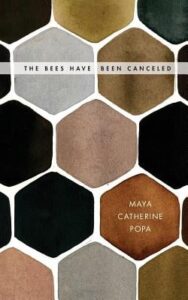
The Bees Have Been Canceled
The On Being Project is an affiliate partner of Bookshop.org and Amazon.com. Any earnings we receive through these affiliate partnerships go into directly supporting The On Being Project.





